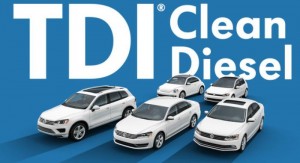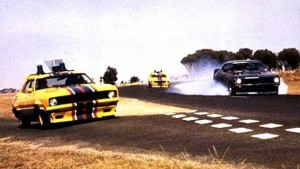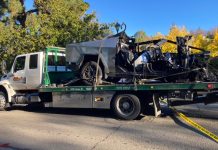Not having to stop is a big deal when it’s dangerous to stop. Which is why a diesel-powered anything could be exactly the right vehicle to have right now – and ongoing. For another reason, too – which we’ll get into momentarily.
This week I am test-driving a 2020 Ram 1500 with the “eco” diesel V6. Whatever it’s “eco” merits, the thing can cover 1,000 miles on one full tank – 33 gallons of diesel. That’s about twice the range of the typical gas-powered economy car and hundreds of miles farther than a hybrid car (more on that below). It is enough range to make it halfway across the country and leave the Golden Horde far, far behind. The Ram could go even farther, too – with a pair of 5 gallon jugs of diesel in the bed. Or convert the very convenient built-in “Ram boxes” on either side of the bed, which can probably hold five gallons each and could probably be plumbed directly into the main tank, bringing your range to more than 1,300 miles nonstop.
Assuming your bladder can go that long. (Men can deal with this exigency – without stopping – by keeping a couple of 2 liter soda bottles in the vehicle.)
A diesel-powered truck will also have the advantage of physical toughness – the ability take (and give) a hit, if that eventuality becomes actuality. If equipped with 4WD, they also have the ability to make their own road – which may be the difference between getting away and not.
A big truck also has lots of room – especially if it’s a four-door cab. Some trucks have so much room – in the back – that two people can comfortably sleep back there. Another valuable feature in a Lord of the Flies scenario.
You might also want to consider a heavy-duty truck. Not that there’s anything wrong with 1500s like the Ram “eco.” It’s that the 2500-series trucks are missing something. They don’t have urea injection – and so you won’t need to worry about DEF (diesel exhaust fluid) levels, which you will with all late-model 1500s. The 2500s don’t have urea injection – yet – because they’re not – yet – subject to the same emissions control regime as the 1500s.
There’s another thing to consider, too. The Ram 2500 is available from the factory with a 50 gallon fuel tank. And its diesel is a V8 – with 850 ft.-lbs. of torque. That’ll part the crowd, no problem.
Older diesel trucks – including 1500s – are free of the DEF gewgaw, too. And some of them will have simpler mechanical injection. Many were available with manual transmissions, which are preferable vs. automatics in an End Times scenario because they’re much easier to fix in the field.
Another option is a diesel-powered car, which will also have the range and something else:
Maneuverability.
A big truck can go through things and over things. But a small car can go around things and squeeze by things that would stymie something larger. They’re also better-suited for high-speed work, being inherently more stable. They are analogous to PT boats vs. battleships. The latter relies on its power to stand its ground; the former on its speed to put it out of an enemy’s reach.
Any late-model VW diesel would make a great get-away vehicle.
Especially one not “fixed” by VW to make Uncle happy for VW’s “cheating” on emissions certification tests. But even if “fixed,” these cars are 700 milers in between fill-ups.
No Prius can match that – especially on the highway, where a hybrid’s range goes down vs. what it achieves in city driving. This is due to the hybrid making the most of not moving – or not moving very fast. During which times, the gas-engined side of the hybrid’s powertrain is off as much as possible and so not burning any fuel, or less of it.
But once on the highway, the battery/electric motor side of the hybrid’s powertrain isn’t powerful enough to sustain movement at 70-plus MPH. The gas engine is on – and working harder.
Which results in less range because it’s burning more fuel.
There is another reason why a hybrid is a terrible choice for a Mad Max machine. It is not a long-term machine, because of the relatively short life (vs. a diesel) of its battery pack.
All batteries eventually lose their capacity to hold charge over time. In the case of a hybrid (or an EV) it’s likely to be noticeable after about eight years of regular use and as that happens, the range reduces – because the gas side of the engine is working more – and harder, because now it has to pull the weight of the car with less and less help from the battery/motor.
Once the battery declines past a certain point, a hybrid’s mileage will be half or less what it was when new. Assuming it’s still drivable at all.
Another issue is the fuel. Which brings up the other reason to buy a diesel for these times.
Gas – especially modern “gas,” which is actually 10 percent ethanol thanks to the Corn Lobby – does not store very well. It is not made for the long haul.
It also a much more refined fuel, literally.
Diesel, on the other hand, stores very well – especially if one adds algaecide (the main issue with diesel in long-term storage). And diesel can be made, no refinery needed. Most diesel engines will happily burn waste vegetable oil and other homebrewed varieties of diesel, which is a fuel that burns from compression and heat, not spark.
The older diesels with mechanical injectors don’t even need an alternator or battery to run once you get them running – and you can get one running by rolling it down a hill and letting out the clutch. They are almost as independent of the grid as your own two legs – and can take you a lot farther a lot faster.
If you haven’t yet spent your “stimulus” check, here’s something that might be worth spending it on.
. . .
Got a question about cars, Libertarian politics – or anything else? Click on the “ask Eric” link and send ’em in!
If you like what you’ve found here please consider supporting EPautos.
We depend on you to keep the wheels turning!
Our donate button is here.
If you prefer not to use PayPal, our mailing address is:
EPautos
721 Hummingbird Lane SE
Copper Hill, VA 24079
PS: Get an EPautos magnet or sticker or coaster in return for a $20 or more one-time donation or a $10 or more monthly recurring donation. (Please be sure to tell us you want a magnet or sticker or coaster – and also, provide an address, so we know where to mail the thing!)
If you’d like an ear tag – custom made! – just ask and it will be delivered.
My latest eBook is also available for your favorite price – free! Click here. If that fails, email me at EPeters952@yahoo.com and I will send you a copy directly!














Eric – another advantage of diesel fuel. S-A-F-T-E-E-E-Y.
Being much less flammable (under 70 degree Fahrenheit, it’s not flammable at all, which is why diesels need glow plugs to start when cold but generally not in the summer), it’s much safer to handle. If you keep several 5 gallon jugs aboard, there will be much less risk of fire due to sparks igniting vapors.
In all fairness, a Highlander Hybrid, the original model, not the bulky disgrace of ’08 and later, has preserved its range, still around 26 MPG on average, coming on 300’000 miles now. But of course you’re right on principle, it gives 28+ in short distance city driving but goes down to 23-24 on the motorway.
Really just great writing Eric!
I still miss the long road trips in the A3 TDI, although in hindsight I probably should have gone with a Q instead. But the Audi had some shortcomings for sure that aren’t as much of a problem in the Jeep.
One other thing that make a HD pickup a useful bug-out vehicle is that many have a PTO on the transmission. This can be used for something like a hydraulic pump or AC generator. Many ambulances and emergency vehicles come equipped with them, one reason I’m thinking about a used one for a potential RV conversion.
Not to mention that with a little structural reinforcement, they could easily handle roof mounted weapons systems, and extensive ammo storage. And don’t forget to add a brush guard or some such to protect the cooling system in case the Dodge needs to do as its name implies. Too bad I’ve spent most of my working life driving pickups, and really hate them as a result. Of course most of those I drove weren’t in the best condition, but they typically don’t drive well, if they will easily handle a load (Ford and Dodge) they don’t ride well, If they ride well (Chevy) they don’t handle a load well, they are expensive to work on, and harder to get in and out of. Haven’t driven one for about 25 years (except for my 4WD 97 Tacoma), so maybe they’re better now.
Always worth 5 mins:
https://www.youtube.com/watch?v=sOi1l_Dkl-A
ax: swear it’s Sprngstien:
https://www.youtube.com/watch?v=sOi1l_Dkl-A
Why are things wrong?
https://www.youtube.com/watch?v=j0-DppU99t4
Apologies for being off topic, but this may be of interest:
RICHMOND, Va. – Virginia Gov. Ralph Northam is expected to announce plans Thursday for the removal of an iconic statue of Confederate Gen. Robert E. Lee from Richmond’s prominent Monument Avenue, a senior administration official told The Associated Press.
The governor will direct the statue to be moved off its massive pedestal and put into storage while his administration seeks input on a new location, according to the official.
————
So the horrors of Reconstruction weren’t enough. Now a complete cultural cleansing and erasure of history are required, while turmoil in the streets provides cover for Gov Coonman’s cowardly act of historical vandalism.
Without its monument, Monument Avenue may have to be renamed. Zionist Martyrs Avenue would please Virginia House Speaker Eileen Filler-Corn, and probably Gov Coonman’s richest donors as well.
Let’s all sing Hatikvah together to celebrate the new age of enlightenment in Virginia!
If you have to bug out in the apocalypse, you are several years behind the curve.
I bought a “fixed” 2014 Jetta SportWagen TDI last December to add to my family’s fleet. My 17 y/o daughter drives it now. I love that thing. My only other diesel was my first car, a 1974 M-B sedan which was 1 year younger than me when I got it at 16.
I love my TDI JSW so much, I find myself searching online for 2015 TDI wagons (last year of TDI, first year of new body style) to add to the fleet. 15 gallons at 36 mpg makes for infrequent fill-ups.
Wally,
When I was back in Karachi, they still have a lot of those old diesel Merc sedans from back in the 70s. Those cars are bullet proof. To Erics point, no electrics – once you switch off the ignition, the engine keeps running, till you pull a knob to choke the engine or something which kills it….. Now thats a car to survive the apocalypse in….
Hey Nasir!
You’ve been conspicuously absent lately!
That was another great thing about those old diesel Benzes- and how thoroughly practical they were: They had that manual kill lever under the hood….in case one day ya’d go to turn the key off and the fuel solenoid failed to close, you could just open the hood, and there was that lever with a big badge on it that said “Stop”.
Practical, simple, bulletproof. That’s what the old diesels were about. Then along came the new breed of engineers and gov’t fatwas (as Eric so appropriately terms them), and now diesels are complex, less-efficient, not reliable, expensive to maintain fiascos!
Hi Nunz!
My diesel tractor is a kind of perpetual motion machine. Roll/clutch start it and the thing will run until the tank runs dry. No battery or alternator needed
Exactly, Eric! So is my diesel tractor, and my diesel mower! Diesel cars and trucks used to be that way too….but no more. That’s why I don’t consider modern diesels “real diesels”. With the modern stuff, the ruggedness and reliability and durability is gone.
Sure, the modern electronically-controlled high-pressure oil-fired ones still often get decent MPGs….but what one has to spend in maintenance and repairs negates it all, and much more.
It’s like comparing our good ol’ simple tractors to a modern electronified computerized software-hobbled John Deere…..
A fun little side issue: If you’ve never seen diesel “runaway”, there are several on Youtube. It’s stunning.
https://www.youtube.com/watch?v=RLRfil14ETI
Eric,
Good to see that you remain rational and “intellectually consistent” on most topics…except for that one.
Gotta agree with you on diesel advantages. Especially the long storage life. In 2014, I was very tempted to get a 3/4 ton, Cummings powered Ram. Those things are great if one is a rancher, in the construction trades, or towing a fifth wheel. For other usage (other than TEOTWAKI) they are too huge to be practical; even for the far outer suburbs. And for most of us, they cost way too much to serve only as a “third car.”
Had Ram offered that 1500 “Eco Diesel” back then, I almost certainly would have bought one. It’s still pretty big. But it offers such a tempting blend of everyday luxury truck and hard core bugout beast. If post Corona depression conditions cut the price on one of those by say 40%, that would be the buy of a lifetime.
Hi Mike,
I’ve got several projects on the backburner – Because Corona – among them, installing a VW TDI engine in my compact pickup. I’m not sure whether it’s physically possible (FWD original application to RWD, etc.) but… what a concept! Twice the torque, twice the mileage… probably could pull 5,000 lbs., too.
A Cummins 3.9 may be an easier swap—a standard SAE bell housing that will match many manual transmissions. You may also need to change the rear axle ratio as the Cummins will run at 2000 rpm or lower easily.
Hi Greg,
Excellent; thanks for the suggestion! The main reason I’ve been thinking about the VW diesel is as a way to annoy the Man. It’d be even more fun to put a VW diesel into a Tesla….
Eric,
Over here in Europe there are some tuning folks online that sell removable tune up kits. I think racechip.de is the same as racechip.com. If you get that engine installed, then add the chip, you should be golden. I once had a 2012 VW Golf TDI. I chipped it to take it from 140hp to 177hp. It was easily removable.
Excellent, Frenchy!
And – glad you’re still around
Reading this reminds me of why I wanted to get a Manual Mk6 (Golf) TDI as a road trip vehicle. Price probably went up, and Diesel isn’t as cheap as it used to be, but after taking a roadtrip across 12 states in my exes Mk7 1.8t with her life packed in it (seriously, we had to mail out 3 boxes, rest of the car was packed so tightly, we were lucky to have ideal seating positions), might as well get something for when I wanna go somewhere but without making as much stops and with something nimble and agile
Great thing is they can still be tuned, they’re tossable and agile, come with stick (Upgrade the clutch obviously), look good with the right mods and again, you can go anywhere with it.
Dammit Eric, now I got a new car of the week xD
I want an old mechanically injected diesel! Ford 6.9, or 7.3 IDI (not PSD) (Old 12V Cummins would be good, if only they weren’t in a Dodge!)
The electronically controlled diesels ain’t the same. Old ones: Start ’em up (Park on a hill and pop the clutch if the starter’s bad or the battery’s dead) and once they’re running, they’re not gonna stop. No sensors, computers, janky connectors or dead batteries will hinder you! Can run on just about anything with doing any harm.
All the modern diesels (Including the 7.3 PSD, although it’s the best of the bunch): Battery goes dead? You’re screwed. One sensor takes a crap….get a little O-ring or copper washer that isn’t sealing 100%? Little corrosion on a connector? Computer gets confused or one of the control modules takes a dump? Put janky fuel in it? She’ll die, and you’ll be waiting for a tow-truck.
VW? Uhh…no. Not unless you can tow a trailer full of specialty tools and parts around…and a German mechanic. TDI’s are nice when they work, but how many old ones do you see on the road?
Plan B: TDI swapped YJ/TJ/ZJ.
You won’t go fast, but you can go far, especially off the beaten path
Ok.. Eric’s been eavesdropping in on convos with my spouse.
Just this week, spouse and I were discussing the ‘protesters’ how they swarm drivers, and begin their destruction on vehicle and driver.
I stated to my spouse, good thing your Gen2 Touareg is a) 5000 GVW and b.) has 406 foot pounds of torque, so you can get yourself out of harms way-easily.
Then Eric writes, “ Any late-model VW diesel would make a great get-away vehicle.”
Too dang ironic Eric.
Also ironic, if it weren’t for vee dubs dieselgate, we most likely would still be in our B7 TDI Passat, not the Gen2 Treg. So thank you VW.
And yeah, we paid mid $20k 2yrs ago, and have that 700 range ‘anxiety’ with the 26 gallon fuel tank. Sure, sell me an electric Golf VW for nearly $40k and an 85 mile range when using the ‘aircon’.
Maybe Malone Tunes should begin a marketing campaign right now for ECM/ECU software upgrades. With a stage two tune, Mr. Treg would output just under 500 foot pounds of torque, along with the horrible side-effect of improved fuel mileage.
Great work Eric!
Thanks, Dipshift!
I often kick myself for not taking advantage of my connections and buying an “A plan” Jetta TDI while they were still available…
2001 F350, 4X, six pack cab, full size bed, 7.3L Powerstroke. Lately spent some money and fixed it up. Modified the fuel system slightly, better air intake, rebuilt/upgraded turbo, four inch exhaust, new tires, reman/upgraded transmission, replaced wheel bearings on all four corners, brake system rebuild/bleed, and flushed/replaced all fluids. Except for the trans reman, I did all the work myself, including pulling/reinstalling the transfer case and transmission. Runs strong, will carry/pull just about anything. With a few extra cans of fuel carried in the bed, it can have a 1000+ mile range. On top of that, no DEF; in fact no pollution control devices anywhere. Also, can burn more questionable diesel like fuels in a pinch – stove oil for instance. It’s heavy, big, and has excellent visibility all around (unlike my POS 2015 car). Fun to drive.
Be careful what ya burn in there, Charles! Unlike the old mechanically injected diesels….the 7.3’s may seem to run O-K at first with some janky fuel…but before long, a few of the sensors will get coated with stuff they otherwise wouldn’t with clean diesel…and you’ll start losing power/shutting down/failing to start…and go nuts trying to figure out why.
This was one of those things that I had to learn about with the TDI. Power Service on every fill was a bit of a pain, especially when trying to get just the right amount in, then dealing with the cleanup and stink coming from the hatch after. At least with a pickup all that can be kept in the bed, but it’s still one more thing that’s “different” from gasoline engines. One thing I didn’t usually have an issue with was fuel quality, but for sure variation in cetane number made a difference, and since stations didn’t give you that information it was hard to tell what the fuel economy will be. Although price would be a pretty good indicator.
#2 home heating oil is pretty much the same thing as diesel, give or take a couple of additives. A 275 gallon residential tank is a couple hundred bucks new, and unless you live in a warm weather climate, probably won’t raise any suspicion. Heating oil is usually a lot cheaper too. Of course, this is just for information purposes only, as the authoritahs don’t look kindly on this sort of thing. #2 is a different color, so they can draw a sample out of your tank and “gotcha”.
Let me just say that I have had first hand experience with that very situation you describe as a kid growing up in rural western PA.